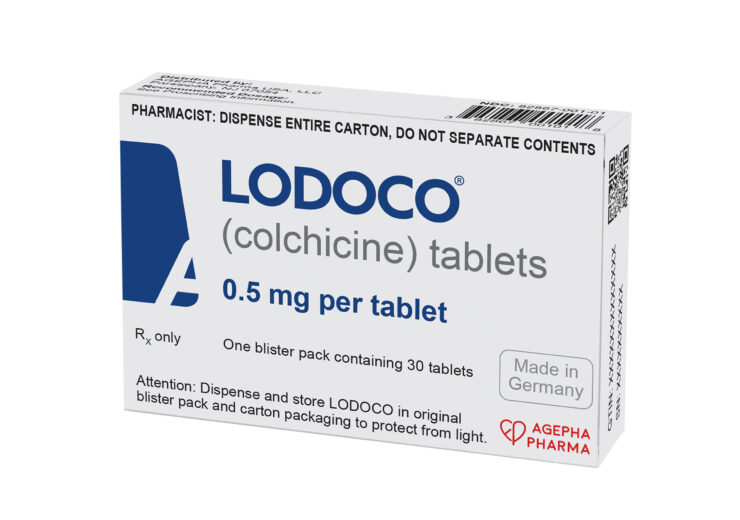LODOCO Targets Residual Inflammation as an Underlying Cause of ASCVD and Can be Used Alone or in Combination with Cholesterol-Lowering Medications

LODOCO can reduce the risk of cardiac events in patients with established cardiovascular diseases by 31% on top of standard of care, will be available for prescription in the second half of 2023. (Credit: Business Wire)
AGEPHA Pharma today announced that, following a Priority Review, the US Food and Drug Administration (FDA) has approved LODOCO as the first anti-inflammatory atheroprotective cardiovascular treatment demonstrated to reduce the risk of myocardial infarction (MI), stroke, coronary revascularization, and cardiovascular death in adult patients with established atherosclerotic disease or with multiple risk factors for cardiovascular disease.
AGEPHA Pharma anticipates that LODOCO, which can reduce the risk of cardiac events in patients with established cardiovascular diseases by 31%2 on top of standard of care, will be available for prescription in the second half of 2023.
Clinical Evidence of LODOCO for Heart Attack and Stroke Prevention
The effectiveness and safety of LODOCO in preventing heart attack and stroke is supported by randomized trial data reported in the New England Journal of Medicine, Circulation, Journal of the American College of Cardiology, and European Heart Journal, while data emphasizing the critical need to address inflammation as much as cholesterol in heart disease patients has been recently described in The Lancet.
The multi-national, randomized, double-blind, placebo-controlled clinical trial was conducted among 5,522 patients with chronic coronary disease all of whom were taking guideline-directed medical care including high-intensity statins. In the trial, 0.5 mg colchicine was found to significantly reduce the overall risk of cardiovascular death, spontaneous myocardial infarction, ischemic stroke, or ischemia-driven coronary revascularization by 31% in comparison with the placebo group when added to high-intensity statins and other cardiology prevention therapies (hazard ratio [HR], 0.69; 95% confidence interval [CI], 0.57 to 0.83; P<0.001).2
Entering a New Era of Patient Care
It has been long understood that inflammation as well as high cholesterol increases cardiovascular risks.
“Approval by the FDA of the first drug to target cardiovascular inflammation is an important step forward for the care of our patients,” said Paul Ridker, MD, MPH, professor of medicine, Harvard Medical School and director of the Center for Cardiovascular Disease Prevention, Brigham and Women’s Hospital, who has been instrumental in elucidating the role of inflammation in cardiovascular disease. Dr. Ridker added, “To treat coronary disease effectively, cardiologists must aggressively reduce inflammation and cholesterol. For appropriate patients already taking a statin, adding the anti-inflammatory drug colchicine at a dose of 0.5 mg daily has been proven to significantly lower risks of recurrent heart attack and stroke.”
A recent study in The Lancet, on which Dr. Ridker served as lead author, demonstrated that among contemporary statin-treated patients, vascular inflammation strongly predicts future cardiovascular events – perhaps even more than high cholesterol.
Reduce Inflammation, Reduce Plaque Formation
Inflammation plays a critical role in Atherosclerotic Cardiovascular Disease (ASCVD). ASCVD is a condition where the arteries become narrowed and hardened due to the buildup of plaque, which can lead to heart attacks and strokes and refers to conditions including coronary artery disease, acute coronary syndrome, peripheral artery disease, and cerebrovascular disease. Patients with ASCVD, the leading cause of morbidity and mortality in the US, are at high risk for acute cardiovascular events.
The formation of atherosclerotic plaque, in which inflammation plays a substantial role, contributes to the development and progression of ASCVD.6 LODOCO inhibits microtubule assembly and has multiple anti-inflammatory mechanisms. High-sensitivity C-reactive protein (hs-CRP) is the inflammatory biomarker most widely used to predict residual inflammatory risk and ASCVD outcomes.
Source: Company Press Release
